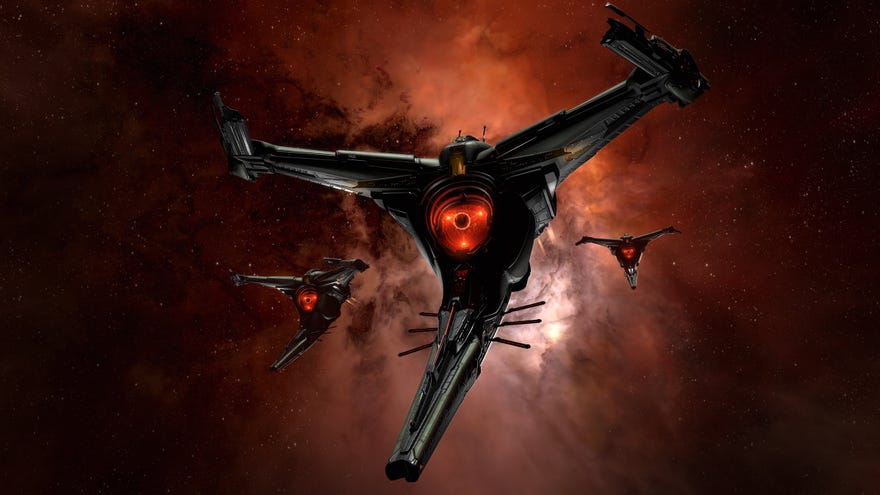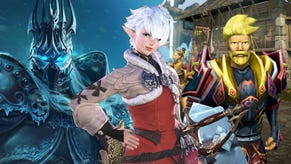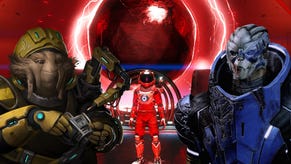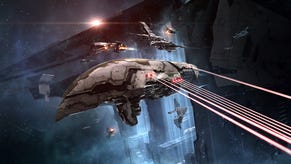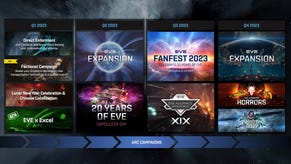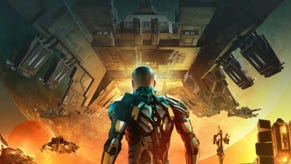Project Awakening is born from EVE Online’s fragility - so it's turning to the blockchain
CCP Games' CEO Hilmar Veigar Pétursson doesn’t want to be forgotten
“Not everyone is Nintendo,” Hilmar Veigar Pétursson says. “Corporate entities, historically, are not very long-living. By being 30 years old, CCP is old by company standards.” As we talk, his fixation on persistence and artefact becomes clear. Though, he’s never hidden it. In 2014, Pétursson’s company, CCP, unveiled a five-metre-tall sculpture with the names of every active player in their MMO, EVE Online, etched into its surface; this year, they expanded the monument to add the names of players who have subscribed in the decade since. “I've been obsessed about doing things like printed books, magazines, models of EVE Online...,” Pétursson tells me, “like there's this need to leave a footprint.”
Pétursson has discovered a company that uses cow stem cells to 3D print calfskin. For the studio’s 30th anniversary, he plans to commission a poetry chapter inspired by Iceland’s epic history book, the Prose Edda, write it on the artificial skin, and put it in a Reykjavik museum. It would sit alongside an ancient calfskin copy of the Icelandic sagas. “It was written 1000 years ago, but as an Icelandic person, I can still read and understand what it says,” Pétursson explains. He tells me that it’s an effective way of storing data because if you sent a USB stick 1,000 years into the future, where would you even find a computer with a drive to read it? This appreciation for artefacts and need for legacy has led to his current project, a new game from CCP using blockchain technology, currently known as Project Awakening.
In 2015, Pétursson tells me, a developer at CCP floated “the idea of storing EVE spaceships on the Bitcoin blockchain”. Despite the name, the Bitcoin protocol, the digital ledger that stores all the coins’ addresses, can hold many kinds of data, including the owners and operators of all the spaceships in CCP’s sci-fi MMO. While Pétursson wasn’t too familiar with blockchain at the time, which he says is surprising because he’s “into disruptive technology”, the idea “was like a little germ in [his] brain”.
It stuck because Pétursson had been worrying about the future of EVE. “I felt a responsibility,” he says. “We are running the database that stores the persistent state of EVE Online.” The existence of the game, one played by hundreds of thousands of players and charting two decades of history, is fragile. Not, as Pétursson explains, because of the physical drives that store all the game data, but “the corporate entity around it”: CCP itself. As he says, video game studios close all the time.
What blockchain offered was a way of untying EVE from CCP. The nature of the technology is that it’s a distributed system with no single central owner. “[Blockchains] live through the power of participants,” Pétursson says. “I think people can well understand that a decentralised system is more fault tolerant than a centralised one. DARPA designed the internet to be decentralised, to be fault tolerant in the case of nuclear war. And, [they were the] smartest people in the world with an endless budget”.
CCP didn’t immediately begin work on a blockchain game, and in the years that the team bided their time, the technology advanced. Many Bitcoin protocol competitors launched, including Ethereum, the digital ledger used to track ownership of NFTs – a development very similar to CCP’s idea to track spaceship ownership on Bitcoin. In 2017, Pétursson watched as two blockchain games launched, CryptoKitties and Axie Infinity, showing the protocol could be integrated into the core of a game, not just used as a kind of offsite storage for a game that was already running.
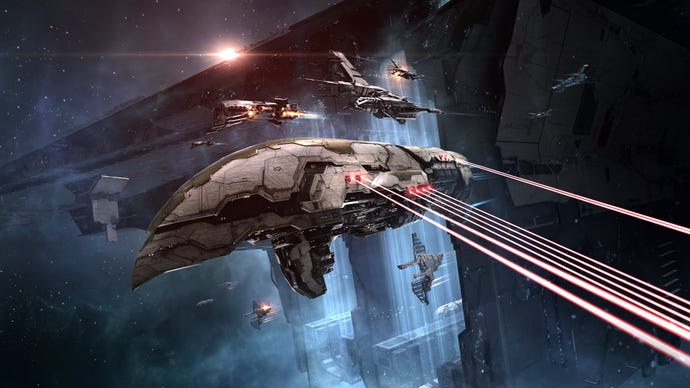
“It became obvious we should go figure this out,” Pétursson says. He found people within CCP who wanted to work on a blockchain project, and then he went looking for investment, finding $40m at venture capital firm Andreessen Horowitz. “We're not taking funds from EVE players to subsidise this effort; we've ring-fenced it.”
While the germinating idea back in 2015 was to transfer EVE data to the Bitcoin protocol, looking at what other developers were doing, Pétursson’s plans grew larger. “It's a whole new game, separate from EVE,” he says. However, per the funding announcement, this new blockchain-powered product, Project Awakening, will be set in the same universe.
CCP is no stranger to player creativity. A whole cottage industry surrounds EVE Online, with players using the developer’s API to create websites that do things like tracking the values of commodities on the in-game marketplace, recording all of the kills in its galaxy of New Eden, and letting players create recruitment pages for their guild-like corporation. Outside of tools, there are dedicated blogs, streamers, and podcasters dissecting all the events and backstabbing taking place online. “We have a partner programme where people can get a licence to do for-profit activity,” Pétursson says. “And this is all a patchwork we've added to as the years have gone on.”
“We live in a world where a large part of the experience is co-created by the people playing the game, but the business model is not a very inclusive setup.”
EVE isn’t unique in this. “Look at any game at scale today; there's a lot of business around it,” Pétursson says. “We live in a world where a large part of the experience is co-created by the people playing the game, but the business model is not a very inclusive setup.” He thinks that “the best implementation so far is a company takes all the revenue and then shares it back through some agreement,” such as the Roblox Creator Hub or Fortnite Creator Portal. “This is not a bad way per se, but it's not super innovative.”
Pétursson wants co-creators to be able to earn through Project Awakening, but not by CCP taking all the money in and then divvying it up, as in a revenue share. He wants to use Bitcoin’s smart contract system so creators earn as soon as a player uses their contribution. Smart contracts are basically triggers you can link to programs stored in the blockchain; when that program is used, it automatically pays out to the person or entity that contributed it. Pétursson describes Project Awakening as an “ecosystem more like a nation that has its own currency” than a shopfront.
As often happens when discussing projects built with emerging technologies, the conversation about Project Awakening is rooted in the abstract. There’s no game yet to look at to see how CCP is implementing these ideas, to gauge whether they will be a success or not, or to judge how they differ from what is already available. It’s also difficult to see what is novel about a project when Pétursson describes it through comparisons to things which already exist. The Roblox Creator Hub, Fortnite Creator Portal, and the third-party community enabled by the EVE API all work, although with some problems. Is Project Awakening doing anything CCP can’t achieve with current technology?
“No,” Pétursson says. “You can usually use old technology to do most things,” Pétursson continues. “People didn't need the jet engine to make aeroplanes. You could still have propellers, and it would work fine. But aeroplanes with a jet engine are more powerful. People always say this, like ‘Do we need cars? Horses are fine’. Yes, I can do whatever with databases. And I can do it in Assembly. Why do we need C++ or Python? Why do we need AI? Why do we need all these things? I can cobble together a Frankenstein’s monster of various technologies. Sure, I've done it a bit. I've been doing software for 30 years. I want to do something cooler than that, and we're going to use this dangerous piece of madness that everyone hates, and I'm going to show the world you can do amazing things with it.”
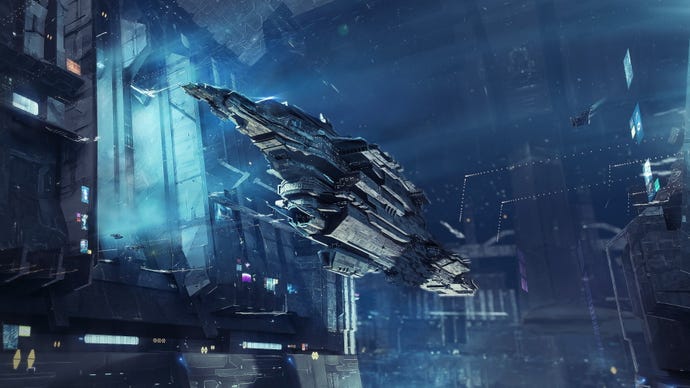
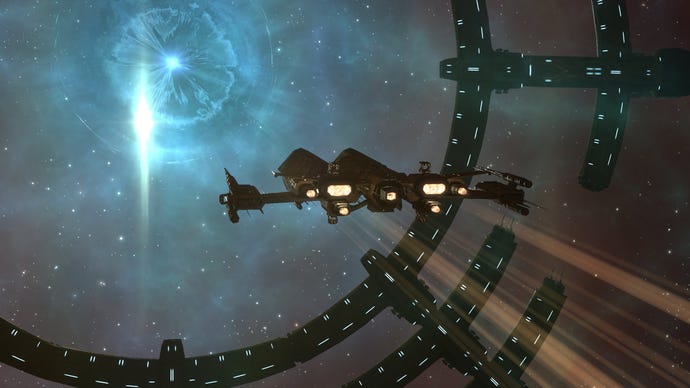
Pétursson’s right when he says people hate blockchain. The past five years have seen a flood of cryptocurrency marketing, bubbles, scams, and very few success stories that match the vision originally pitched, not to mention the environmental costs. Cryptokitties, the blockchain game launched in 2017, may have had thousands of trades a day at its peak, but it now often sees fewer than 100. Meanwhile, Axie Infinity relies on cheap labour from countries like the Philippines, and its currency lost 99% of its value during the 2022 cryptocurrency crash. A month later, North Korean hackers stole $615 million from the trading network that let players transfer money into and out of the game. A recent report on DappGambl found that 95% of NFTs are now completely worthless. There’s not much love or trust for blockchain, and many posts on the EVE Reddit attack CCP and Pétursson for engaging with the technology.
This is partly why Pétursson is keen to stress that Project Awakening and its funding are separate from EVE. He’s also said, both online and during EVE Online’s 20th anniversary Fanfest keynote, that NFT stands for ‘Not for Tranquility’ – the name of the MMO’s main server.
However, blockchain’s track record has not swayed Pétursson: “People do stupid things with everything. Like in the 1700s in Holland, people made [speculative] bubbles with tulips. Are tulips bad? The tulips are not to blame. People are to blame. People do stupid shit with new things all the time. It's just what we do. Look at any industry; there are people doing bad things, people doing nefarious things, people doing stupid things, and people doing very cool and wholesome things. I just don't care how bad people have used [blockchain] in the past. If people hate me for something they're assuming I'm going to do that I'm not doing. Not my problem; it's their problem.”
While I still don’t have a clear idea of what Project Awakening is – what genre it is; what players, not co-creators will do in it; how it fits into the EVE Online universe – I can see the shape of it, and I can see why Pétursson is intent on making it. And, he is, as he will admit, a stubborn man. After all, CCP has been steadfastly trying to make a successful shooter for fifteen years. Talking about his blockchain vision, he says “If it takes a few decades to get this right... I mean, the sooner you start, the sooner you're done.”
It’s more than stubbornness, though, as you can see through so much of what CCP has done since it was founded in 1997: it’s a need to persist. “This is the germ that drives,” Pétursson says. “Whether it's blood on calfskin or a blockchain – these things must not be forgotten.”
